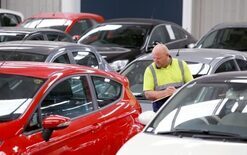Exemptions from clean car charges

The Low-Volume Vehicle Technical Association (LVVTA) has described the consultation process around the clean vehicle policies as “fair and sensible” when it comes to excluded vehicle groups.
Tony Johnson, chief executive officer, says with legislation being passed for the new clean car discount, which is now operating, and the clean car standard, the LVVTA has been able to establish exactly which groups of vehicles will not face charges.
“The Ministry of Transport [MoT] has, during the development of the discount and standard, always recognised there will be some groups of vehicles that should not have fees imposed on them.
“In an effort to get this right, the MoT consulted with the LVVTA and other enthusiast-vehicle groups during 2021 and early this year, including the Federation of Motoring Clubs, Vintage Car Club of NZ, the NZ Hot Rod Association and MotorSport NZ.
“This consultation process has ensured that a set of excluded vehicle groups has resulted that are exempt from paying any charge.”
These groups are as follows:
Vehicles at least 40 years old
Any vehicle that’s 40 years old or older as of April 1, 2022, is excluded. This means, currently, all vehicles which were manufactured on or before 1982 do not attract a charge.
The LVVTA and some other associations lobbied the MoT to consider making the cut-off at 30 years old in order to recognise “modern classics”, but this was unsuccessful.
“We do believe, however, this blanket recognition of 40-year-old vehicles is quite reasonable, if not ideal,” says Johnson, pictured.
Scratch-built low-volume vehicles
All scratch-built low volume vehicles are excluded, and this includes those constructed in New Zealand and overseas.
A scratch-built vehicle is, in simplest terms, a vehicle which is manufactured, assembled or scratch-built in quantities of 500 or less in any one year, and when its construction may directly or indirectly affect its compliance with any vehicle standards prescribed by New Zealand law.
Essentially, scratch-built vehicles are all typical replica vehicles and also those modified so extensively they could not be considered to still be the production model from which they originated.
Motorsport vehicles
Motorsport vehicles, within this context, are legitimate road-going motorsport vehicles used for competition purposes. They are excluded from paying charges.
The most common application for this is rally cars when they are required to be road-registered in order to be driven on public roads between special stages. Some club sport cars are also used on-road and for weekend racing.
Johnson says: “In all cases, these vehicles will need to be owned by competition licence-holders, used in competition activities, meet stringent safety requirements and be issued with a LVV authority card.”
Disability vehicles
People who need to use vehicles, either to enable the safe transportation of a disabled person or enable a disabled person to self-drive, are often restricted as to the type of vehicle they can use.
Many vehicles that meet the individual needs of the user may not be available in a low-emitting variant, so these vehicles are also excluded from paying a charge.
A disability vehicle, in this context, means a light vehicle used for the transportation of a person with a disability and is either:
• Modified to enable a person in a wheelchair to safely enter and exit the vehicle, and enable the person and wheelchair to be safely restrained while it is moving, or
• Provides a person in a wheelchair, or of limited mobility, with assistance to enter and exit the vehicle by using a swivel or swing-out seat.
Special-interest vehicles
Special-interest vehicles (SIVs) are also excluded from any charges. A SIV must be less than 20 years old and not meet Waka Kotahi’s frontal-impact or exhaust emissions standards, and has been issued with a SIV permit by the transport agency.
This exclusion does not apply to modern left-hand-drive (LHD) vehicles, such as Chevrolet Camaros and Corvettes, Ford Mustangs and Dodge Challengers, which may be eligible for a LHD permit, unless they also meet the criteria to be defined as an SIV because they don’t meet frontal impact or exhaust emissions standards.
The bigger picture
“It’s important to note that all the explanations above are generalised,” stresses Johnson. “Someone considering building or importing a vehicle should do their homework to determine for sure whether it falls into an excluded group or not.”
He describes the clean car policies as, in essence, being a “gas guzzler” tax. “Such a tax already exists in many other parts of the world and was always going to arrive here sooner or later.
“Fortunately, we’ve come through this potentially threatening legislative process very well and most enthusiasts can continue to enjoy their hobby without any new impediments.
“If you learn the vehicle you want to import or register is outside of the excluded groups, there are two key things to remember before becoming despondent.
“The legislation isn’t saying you can’t register the vehicle. It’s just saying you have to pay a charge. And if you have to pay the charge, the maximum payable for a second-hand vehicle is $2,500 plus GST. It’s absolutely not the end of the old-car hobby.”





